I’m New Here: Week Thirty-Six…
November 1, 2019 by Stephanie Williams · Leave a Comment
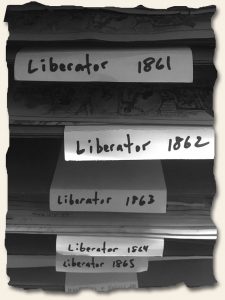 This week I discovered another section of the archives previously unexplored — actually, I didn’t even realize it was there.
This week I discovered another section of the archives previously unexplored — actually, I didn’t even realize it was there.
The walls in these connected buildings are shelved from floor to ceiling, as are the aisles and corridors. Inside those rigid 15′ dividers are movable racks that provide another layer of coordinates for filing archival folders of old and rare newspapers. It was here, highlighted by the angle of the tag, that I saw the title and date of voices for abolition. The Liberator issues that are housed here go as late as 1865, but I was interested in the ones that preceded the Emancipation Proclamation. What was being written and discussed by this publication from the “Anti-Slavery Office” in Boston in 1859? What was the tone prior to that April bombardment that marked the start of the Civil War?
The rag paper is full-sized (“folio”, in fact) and consists of four pages, mostly devoted to telling the stories of injustice and accounts that should provoke outrage. Headed by an illustration intricately representing people divided into groups based on the color of their skin, a banner curves along the bottom proclaiming, “THOU SHALT LOVE THY NEIGHBOR AS THYSELF” while a sign above a wooden structure crowded with human beings advertises, “Slaves, Horses & Other Cattle In Lots To Suit Purchase.” I feel the effectiveness of the graphics, of the pleading tone in the “Letter to Southern Ladies” and the headline which queries, “Shall Massachusetts Be Slave-Hunting Soil?” But what surprises me the most in this new acquaintance was the attitude toward the forerunner of Abraham Lincoln. A full front-page column is headed “PRESIDENTIAL FALSIFICATIONS”, and pulls no punches in its criticism of James Buchanan’s avoidance of the situation with the Free State Men of Kansas and the powerful politicians whose support of Slavery led to an effort summarized with, “The Missourians openly exulted in the sure prospect they had of making Kansas a slave state, in spite of the Free State men.”
I am looking forward to delving into the dates that discuss the events that followed — in all the permutations and compromises and regrets and triumphs. And I can’t help but wonder how much of a change anyone could have honestly expected after such a long period of such passionate division.
Snapshot 1852… Uncle Tom’s Cabin…
July 29, 2019 by GuyHeilenman · Leave a Comment
The following snapshot comes from the National Intelligencer dated December 28, 1852. Most are aware of the impact Harriet Beecher Stowe’s Uncle Tom’s Cabin had on the fabric of The United States, but not everyone saw eye-to-eye. The image below shows a blurb of a politically incorrect view from the northern region of the country.
Snapshot 1827… Fourth of July – New York abolishes slavery…
July 4, 2018 by GuyHeilenman · Leave a Comment
The following snapshot comes from the July 9, 1827 issue of The Connecticut Courant, Hartford…
Snapshot 1969… Teddy Kennedy in hot water…
April 7, 2018 by GuyHeilenman · Leave a Comment
The following snapshot comes from the July 26, 1969 issue of the Springfield Republican, Springfield, Massachusetts…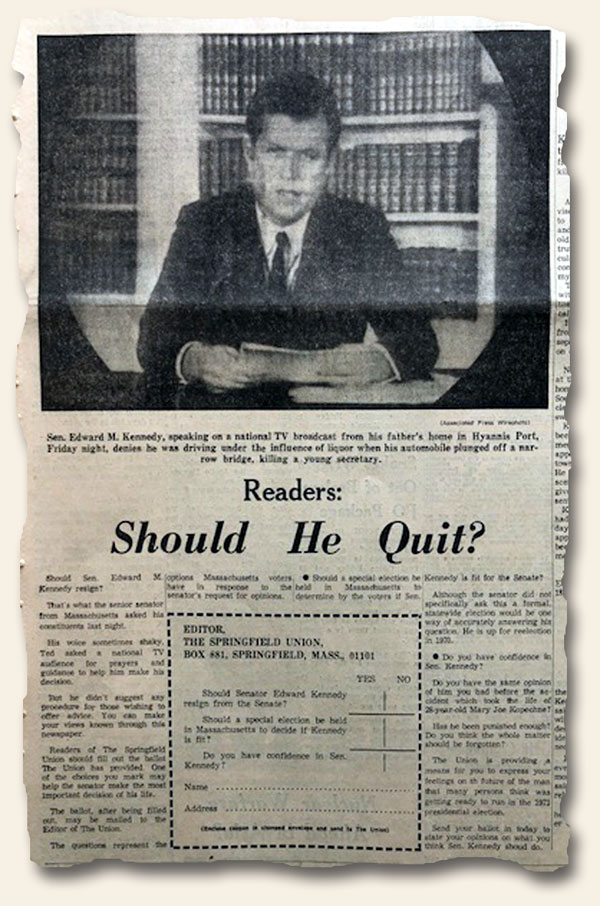
Snapshot 1969… Teddy Kennedy (was) in cold water…
April 4, 2018 by GuyHeilenman · Leave a Comment
The following snapshot comes from the July 20, 1969 issue of the Springfield Republican, Springfield, Massachusetts…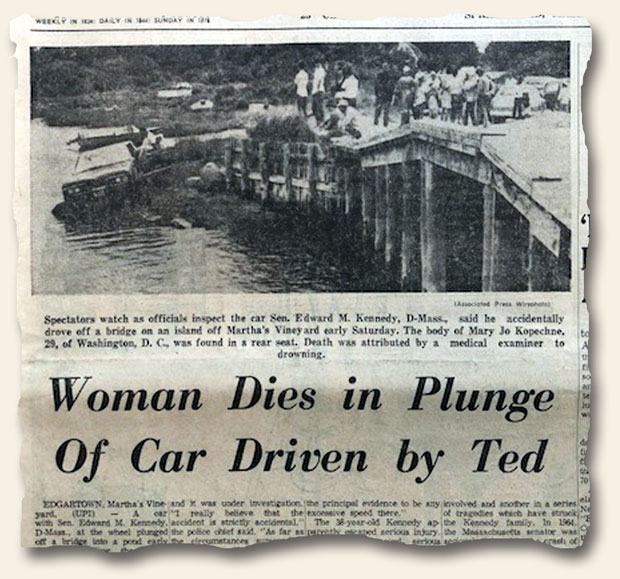
Snapshot 1817… Slavery…
March 30, 2018 by GuyHeilenman · Leave a Comment
The following snapshot comes from the February 20, 1817 issue of the National Intelligencer, Washington (D.C.)…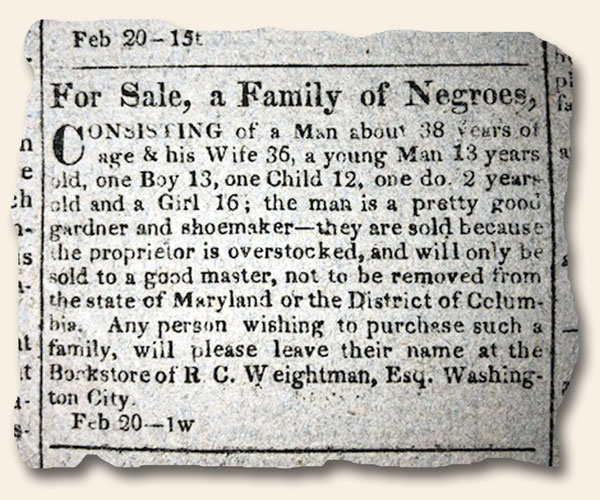
They put it in print… Slavery is not a respecter of race, color, or creed…
March 24, 2018 by GuyHeilenman · Leave a Comment
Slavery, along with its multitude of abuses, has been part and parcel of society for millennia. This point was brought to the forefront as we were reading a July 10, 1671 London Gazette. It reports of letters from the Island of Corfu which talk about Turks transporting Christian slaves – with a mention that they were good workers. While a bit troubling, it also makes a request for everyone to stay clear of the vessels in order to keep the peace. Interesting.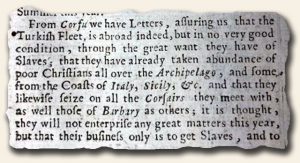
The best of the best from the mouth and/or hand of Abraham Lincoln…
September 25, 2017 by GuyHeilenman · Leave a Comment
What is Abraham Lincoln’s most noteworthy speech, proclamation, letter, etc.? The Emancipation Proclamation? His Thanksgiving Proclamation or proclamation for a National Fast Day? Perhaps it was his 1862 Annual Message to Congress, his 2nd Inaugural Address, or his last public address in 1865? Of course the “go to” answer is often what we now refer to as The Gettysburg Address. The choices are almost endless. However, below is a candidate which appeared in an issue of The Crisis (Columbus, Ohio, May 4, 1864) I’d like to throw into the mix. Why it flies under the radar of notoriety and has never received more recognition is rather perplexing. What are your thoughts? Note: I’d like to thank a friend of Rare & Early Newspapers for suggesting I take a 2nd look.
Victor Hugo – poetry in early 19th century Gentleman’s Magazines…
June 29, 2017 by GuyHeilenman · Leave a Comment
In our opinion, one of the early titles we come across, The Gentleman’s Magazine, is grossly underappreciated. This London “Reader’s Digest-sized” publication which spanned the early 18th through mid-19th centuries and was known for great reporting from throughout the world, was also pregnant with book reviews, poetry, mathematical challenges, birth and death notices, and an abundance of plates depicting everything from maps to sketches of rare animals, historical cathedrals, and notable men and women of the era. While we’ve written about this title in previous posts (view posts), our attention this time around is in regards to poetry – with a question.
Whereas nearly every issue contains poetry of the period, the poets are often unknown to me, and therefore, rarely catch my eye. However, during the process of scanning The Gentleman’s magazine for July, 1833 looking for content related to the Slavery Abolition Act of 1833, one name in the heading of a poem caught my eye: Victor Hugo. After reading the poem – and being moved, I became curious as to whether this was an early (1st???) printing – and therefore more valuable as a collectible, or if he had penned it many years prior. Unfortunately a cursory on-line investigation came up empty in regards to a validation that the poem was even written by him, let alone its original date of publication. Of course this begs the question: Can anyone attribute this to him and/or confirm its first printing? If anyone is in the know, please share your knowledge with the collectible community. Thanks in advance. AND as for the poem itself:
Perhaps not a perfect system, but… Happy Memorial Day!
May 30, 2016 by GuyHeilenman · Leave a Comment
Is the United States perfect? Certainly not. Our forefathers did not sacrifice time, security, and in many cases, life or limb for the sake of a perfect system of government. Their hope was to establish a government for the people – which would provide the opportunity for all to pursue happiness in an environment free of governmental oppression and steeped with a host of inalienable rights. For some, “all” meant everyone. To others, “all” was defined quite narrowly. Still, even those who had a broader view understood the benefit of compromise – for the purpose of establishing a system which would have enough flexibility to adjust to their broader view of “all” over time. We know now the great advancement in this regards only came through a Civil War; however, it came. A perfect system? No. The best system ever constructed by man? Absolutely.
As we contemplate the great sacrifice paid by many to create and preserve this “best system” under God, the New York Tribune dated July 7, 1854 help us to capture the tension and need for growth that was evident to many in the 1850’s. Allow a negro to become a member of Congress? Could this be possible? Those who knew Frederick Douglass certainly thought so. Please enjoy:


